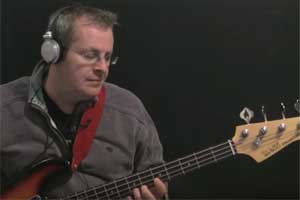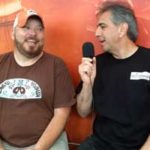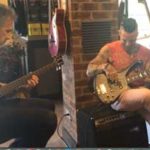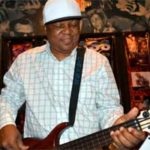British rocker and esteemed educator discusses his highly acclaimed “Deliberate Practice” method and how to get really, really good on the bass!
Exclusive interview with FBPO’s Jon Liebman
September 20, 2010
Paul Wolfe is a bass player, band manager and teacher. His dissatisfaction with the teaching of the bass guitar for private students led him to start his own website on the topic of how to play bass. Paul teaches beginners on the bass guitar using an innovative, interactive system of online bass lessons. His research on proper and effective practice techniques culminated in his own eBook/multimedia course, Deliberate Practice.
FBPO: Tell me about your musical upbringing?
PW: I didn’t start playing bass until I was 15 or so. Three of us at school wanted to be like our idols of the time, Canadian power trio Rush. There were some older guys at school who were in a band and our music teacher at the time was reasonably progressive and persuaded them to offer “rock” lessons to anyone who was interested. So I started taking bass lessons. This would be about 1977. Those lessons cost me a pound each. One of the first things I learned was a simple walking blues line.
FBPO: How did you end up choosing the bass? In our generation it’s often because all the “good” instruments were already taken. Was that the case with you?
PW: Not quite. My friends and I wanted to be like Rush. One guy really wanted to play drums, leaving me to choose between the “Alex Lifeson” and “Geddy Lee” roles. Memory tells me I wanted to be more like Geddy Lee, so it was bass for me.
FBPO: When did you start playing professionally? What sort of gigs did you do?
PW: I started playing professionally in the late ’80s. I put a cover band together with a singer and we went out to play in ski resorts in the French Alps. That band then went back to the UK and did the “upmarket cover band” thing, which included weddings, corporate functions and charity balls. I did some other stuff along the way, too, like jazz-type gigs in restaurants and some tribute band work, backing look-alikes of stars like Freddie Mercury, Tom Jones, Robbie Williams and Tina Turner.
FBPO: It’s interesting that you cite a lot of UK artists as influences – Sting, John Deacon, Dire Straits, Led Zeppelin, etc. We Americans know all about the British Invasion that began back in the ‘60s, but weren’t you influenced by anyone from our side of the Atlantic as well?
PW: Of course I was! There are a bunch of great bass players from your side of the pond. My number one bass-playing idol since the ’70s has been James Jamerson. I think I bought one of the first copies of Standing in the Shadows of Motown when it came out! My version had cassette tapes, which I’ve still got. I loved playing out of that book. Totally inspirational!
Another American bassist I like is Rocco Prestia. In fact, I discovered Rocco through the Motown book, as he played one of the tunes in it. This was way before the Internet and I’d never heard of Tower of Power. Once I became aware of the band, I started checking out Rocco’s playing and I really liked it! My favorite Rocco lines are “Only So Much Oil,” “Soul With A Capital S,” “Credit” and a tune called “I Do My Best Work at Night” from a side project called Strokeland Superband.
Recently I’ve been listening to the best-kept secret in American rock music, Garry Tallent. His playing on “The River” is a masterclass in rock bass playing! Supportive, imaginative, melodic… Just stand-out performances on nearly every track.
Finally, there are two deep, original thinkers, both of whom are extraordinary musicians and both happen to be bass players. I’m talking about Victor Wooten and Gary Willis.
FBPO: How did your Deliberate Practice method come about? What inspired you to become an educator?
PW: In 2007 I started researching the topic of practicing for the bass guitar for an eBook I was going to write. I originally envisaged it as a cross between a goal-setting book and a time management book, with some practical bass stuff thrown in.
Through the course of my research, I came across a book called Talent is Overrated by Geoff Colvin. It’s actually a business book, but the topic is about how to acquire mastery in a chosen area through a specific type of practice. That specific type of practice is called Deliberate Practice. The concept of “deliberate practice” isn’t mine, but I saw immediately how the same principles could be applied to the bass guitar.
The term “Deliberate Practice” was actually coined by Dr. Anders Ericsson. He’s an emeritus professor at the University of Florida and one of the world’s foremost experts on the subject of acquiring expertise. Ericsson conducted a now-famous study of violinists in the early ’90s. The conclusions of that study were published in a paper called The role of deliberate practice in the acquisition of expert performance. It’s a very scholarly report, actually expounding on the notion that it takes 10,000 hours of practice to become a master of something. Ericsson, however, uses the term “virtuoso,” rather than master. Most significant, however, is that he stresses that becoming a virtuoso takes not just 10,000 hours of practice, but 10,000 hours of deliberate practice. I studied Ericsson’s writings, as well as some other literature on the topic, and tried to distill the essential principles of “deliberate practice” in a way that could be applied to the bass guitar.
FBPO: What can someone expect to gain from going through your method?
PW: The first thing one needs to do is establish his or her bass-playing goals. Those goals need to be specific and measurable. Then the student can break down those goals into smaller, more manageable chunks and construct a practice system that not only facilitates achieving those goals, but measuring progress every step of the way. That way, one can set five-year goals, for example, with a detailed “roadmap” of how to achieve those goals. Following this system should indicate if the student starts veering off course.
It’s a very satisfying process to lay out bass-playing goals in great detail and then lay out a plan that will take you to the fulfillment of those goals. Too many players routinely run scales, arpeggios or exercises like that. Unless those exercises are aligned to bass-playing goals, a lot of practice time gets wasted.
I speak from bitter experience here. I studied privately with someone who had me practicing every imaginable scale in every configuration for three to four hours a day for eighteen months. I did get marginally better, but my return on investment of the hours I put in was terrible!
I don’t believe the rote learning of scales is productive for bass players. Had I known about “deliberate practice” at the time, I would have been able to audit my practice and work out pretty quickly that the hours I was spending on the rote learning of scales was wasted.
FBPO: Can you elaborate a little more on how Deliberate Practice is different from other methods available to wannabe musicians in general and wannabe bass players in particular?
PW: As bass players, we’re relatively poorly served from an educational viewpoint because the electric bass is only fifty years old. There’s not an established educational orthodoxy that students can fall back on in the way there is for other instruments. Deliberate Practice is the only method I know of that stresses aligning practice with bass-playing goals, all the while providing a measurable way of accomplishing those goals.
Some of the early feedback I received on the book was from the great double bass player John Goldsby, who said, “I urge you to continue pursuing Deliberate Practice. You can help a lot of musicians become better players.” I wish I’d had Deliberate Practice twenty years ago. I’d be a hell of a player by now! Though I can’t get back that time, the next best thing is to try to get these ideas out there so other musicians can benefit from them.
FBPO: Is it equally applicable to beginners as well as more advanced players?
PW: Deliberate Practice is applicable for players of all levels, even players of other instruments. For that matter, any discipline, musical or otherwise, that you want to get better at. For beginners, Deliberate Practice is something that’s perhaps best done in conjunction with a teacher or mentor that understands the system. Players from intermediate level and upwards will comprehend the system relatively easily and should be able to take the principles of Deliberate Practice and apply them to their own practice routines to make sure they are always improving.
FBPO: I understand you have some other products you’ve created, as well. Tell me about Practice In Your Dead Time.
PW: Practice In Your Dead Time started from a casual series of e-mails I had with one of my online students. This is a guy in his mid 40s with a busy professional life, plus a family too. He jokingly said something like, “I spend nearly two hours a day on the train. If only I could play my bass then, I’d be sorted for practice time!”
So I emailed him and suggested a series of things he could do to make that time useful to his bass playing and his goals with the bass guitar. I didn’t hear from him about it for a couple of weeks and then he e-mailed out of the blue, saying he’d tried some of the exercises and they worked, and did I have any more suggestions so he could put the time he was commuting to better use!
That was how it started. Practice In Your Dead Time is aimed at giving you bass-related activities you can do when you don’t have your bass handy, like when you’re on the train, in a car, walking or exercising. We all have segments of time where we’re doing repetitive tasks that only require a little brainpower. We can use that time to improve our bass playing, even though we don’t have our basses handy.
FBPO: How about Bass Hanon?
PW: Bass Hanon was the first book I wrote, 18 months ago now. It’s simply a collection of exercises that are based on the Hanon exercises for piano. The piano Hanons are in the key of C only. I transposed each Hanon to every key – well I’ve only done Volume 1 so far, so the first 20 – and put them together into an eBook. What I like about the Hanon exercises are the infinite ways you can change them around so you have a semi-musical practice tool to use for whatever technique you are working on. There’s also a companion book called The Hanon Variations, which gives 30 variations of every Hanon exercise. The exercises are great tools for warming up, working on left-hand technique, left- and right-hand coordination and fingerboard familiarity. I believe I read in the UK’s bass magazine that Janek Gwizdala has used them for practice.
I’ve been working on and off on Bass Hanon, Volume 2 for six months as well. Every time I think I can really get to work at it, something else comes up and it goes to the back of the pile.
FBPO: What else is happening in your career?
I have a number of students all over the world whom I teach by taking advantage of the Internet. A lot of my students are based in North America, but I’ve got students in Germany, Holland, Australia and Singapore.
I’m also working on a course that will look at the work of James Jamerson and teach it in a step-by-step fashion. The way I teach just about anything now incorporates the same approach as Deliberate Practice and this course will be no different. I’m really excited about it, as it’s something I’ve wanted to do for a while.
I’m also working on a couple of new topics for the next version of Deliberate Practice. These are areas that either didn’t make it into the first version or ones I came up with after that first version was released.
I’ve got some gigs coming up in the autumn too. I’ll be dusting off the suit and polishing the shoes in September for a couple of weddings and a big charity event in London’s West End.
FBPO: What do you like to do when you’re not immersed in music?
PW: I like to hang out with friends, take the kids to the park and play soccer, drink Guinness every now and then … regular stuff.





